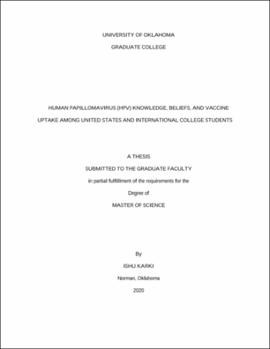| dc.description.abstract | Introduction: Human Papillomavirus (HPV) infection is the most common sexually transmitted infection worldwide and is associated with different types of cancer in both men and women (CDC, 2016). Nearly all sexually active individuals who has not had the HPV vaccine will get the HPV infection at least once in their lifetime (CDC, 2016). HPV vaccination is the primary prevention strategy for HPV-related infections and cancers. The HPV vaccination rate among male and female adults aged 22-26 years is 13.5% and 46.6% respectively (CDC, 2018e). The purpose of this study was to compare knowledge about HPV and HPV vaccine, beliefs of college students towards HPV, and HPV vaccine uptake between US and International college students studying in the US.
Methods: The study was conducted among 588 graduate and undergraduate students in a University setting. The study measures included demographics, HPV and HPV vaccine awareness, HPV knowledge, HPV vaccine knowledge, HPV beliefs, and HPV vaccine uptake. HPV knowledge scale and HPV belief scale were derived from previously validated measures and HPV vaccine knowledge was adapted from other studies. Data was collected via an online survey using Qualtrics. The survey link was sent to students at a Southwestern University with active email addresses via campus-wide email. Participants who chose to enter an incentive drawing were randomly selected, and 30 participants received an e-gift card or check. Data were collected between November 2019 to January 2020. After checking descriptive statistics and differences between completed and missing responses, independent sample t-test, chi-square test, logistic regression, and multiple regression were performed in SPSS.
Results: A significant difference was found in HPV awareness, HPV vaccine awareness and HPV vaccine uptake between the US and international college students. HPV and HPV vaccine awareness and HPV vaccine uptake were higher among US college students than international college students. However, there was no difference in HPV knowledge, HPV vaccine knowledge and HPV beliefs between US and international college students. US students, females, and sexually active persons were more likely to have heard about HPV. Similarly, females, White (compared to Asian), and people with higher ages were predicted to score higher in the HPV knowledge scale. Females and people scoring higher in HPV knowledge scale were more likely to have heard about the HPV vaccine. People with a higher HPV knowledge were predicted to score higher in the HPV vaccine knowledge scale. People with higher HPV and HPV vaccine knowledge scale were predicted to score higher in perceived benefit of HPV vaccine scale and score lower in perceived barrier to get HPV vaccine scale. Females, people with higher HPV knowledge, and people with less perceived barrier belief were more likely to have received the vaccine.
Conclusion: This study aimed to compare the HPV knowledge, beliefs and vaccine uptake among the US and international college students. Unlike many other studies conducted among college students about HPV, this study has particularly considered international students studying in the US. College students are an important target population for HPV and HPV vaccine. This study showed the existing disparities between US and international college students regarding HPV and HPV vaccine awareness, and HPV vaccine uptake. Every year, there are thousands of international students admitted to Universities in US from around the world. College health centers could play a crucial role in raising awareness of HPV and HPV vaccination by organizing various intervention programs. This study found the higher level of HPV knowledge was associated with HPV vaccine uptake. Thus, it is important to raise HPV awareness and knowledge to reduce HPV-associated infections and cancers that take thousands of lives every year. | en_US |
